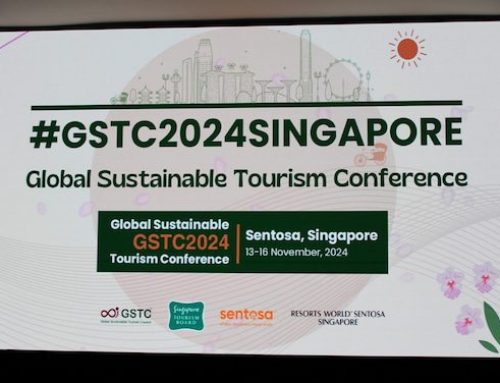The Global Sustainable Tourism Council (GSTC) is pleased to announce that Dream&Charme has gained the GSTC-Accredited Certification Body status.
Dream&Charme is an Italy-based international certification body with headquarters in Milan, Italy. The company, founded in 2006, is dedicated to maintaining high standards in the hospitality industry, focusing on sustainable practices and hospitality reliability across various accommodations worldwide.
Dream&Charme is accredited by ACCREDIA to certify hotels worldwide (except China) against the GSTC Hotel Criteria in compliance with ISO/IEC 17065 and additional GSTC requirements.

Businesses certified by a GSTC-Accredited Certification Body, meeting all the GSTC Criteria (or a GSTC-Recognized Standard), have the highest level of assurance* and credibility available. With an accredited certification, customers and buyers are assured that the business was certified in a credibly verified procedure in a transparent, impartial, and competent manner.
Certification by an Accredited Certification Body can be referred to as “accredited certification”.
Attesting to that, those businesses certified by a GSTC-Accredited Certification Body can display a unique GSTC logo with a traceable code. The purpose of the GSTC Accreditation is to provide a higher level of assurance and reward genuine practitioners of sustainable tourism, which builds confidence and credibility with consumers.
“Accreditation deserves much more attention and appreciation from the hospitality and tourism industry,” says GSTC CEO Randy Durband. “Most eco/green/sustainable labels for tourism businesses operate without external review, meaning that their rigor and impartiality is unknown. The GSTC Accreditation Manual and process is the most credible, and perhaps only, external review of sustainability labels in the industry.”
The accreditation assessments for Dream&Charme were conducted by Accredia**, the Italian National Accreditation Body that provides GSTC Accreditation in Italy, since October 2023. GSTC aims to enhance collaboration with EU national accreditation bodies to align with Regulation (EC) No 765/2008***, and Accredia is the first national accreditation body agreed to conduct the GSTC Accreditation in Italy. The Accredia accreditation againts ISO/IEC 17065 is reconized by IAF (International Accreditation Forum) by 95 countries of the world. (www.iaf.nu)
“Obtaining GSTC accreditation was an extremely important milestone for us because we have received numerous requests for GSTC Certifications, as we focus on the hospitality sector since 2006. Dream&Charme is truly proud to be a model for other Certification Bodies. We are at the disposal of the accommodations that decide to take the path of sustainable development seriously and in accordance also with European directives,” says Giorgio Caire di Lauzet Dream&Charme Founder & CEO.
The GSTC Accreditation Manual for Certification of Hotel/Accommodation & Tour Operator provides detailed technical requirements for certification of Hotel/Accommodation and Tour Operator. Certification Bodies are required to comply with ISO 17065 Conformity Assessment (Requirements for bodies certifying products, processes and services) and GSTC specific requirements. Among these requirements are impartial and competent certification procedures, auditor experience and qualifications, certification decision making, rigorous surveillance of certified businesses, and proper promotion of their services.
Hotels that follow sustainability standards that wish to stand out with reputable certification as a sustainable hotel, should seek sustainable hotel certification by a GSTC-Accredited Certification Body.
Tour Operators that want to demonstrate through their adherence to sustainability standards are encouraged to seek sustainable tour operator certification by a GSTC-Accredited Certification Body.
Destinations that are managed in accordance with sustainability standards can aim for destination certification by one of the GSTC-Accredited Certification Body.
About the Global Sustainable Tourism Council (GSTC)
The Global Sustainable Tourism Council® (GSTC®) establishes and manages global sustainable standards, known as the GSTC Criteria. There are three sets: Destination Criteria for public policy-makers and destination managers, Industry Criteria for Hotels and Tour Operators, and MICE Criteria for Venues, Event Organizers, and Events & Exhibitions. These are the guiding principles and minimum requirements that any tourism business or destination should aspire to reach in order to protect and sustain the world’s natural and cultural resources while ensuring tourism meets its potential as a tool for conservation and poverty alleviation.
The GSTC Criteria form the foundation for GSTC’s assurance role for Certification Bodies that certify hotels/accommodations, tour operators, and destinations as having sustainable policies and practices in place. GSTC does not directly certify any products or services, but provides accreditation to those that do. The GSTC is an independent and neutral USA-registered 501(c)3 non-profit organization that represents a diverse and global membership, including national and provincial governments, leading travel companies, hotels, tour operators, NGOs, individuals and communities – all striving to achieve best practices in sustainable tourism.
Information for media and the press: www.gstcouncil.org/about/for-the-press/
About Dream&Charme
Dream&Charme is an International Certification Body founded in Italy in 2006, specializes in evaluating and certifing only accommodation and in tourism industry for sustainability and reliability.
Accredited ISO/IEC 17065 by the Italian Accreditation Body Accredia since 22/6/2020 for DCA ESG and since 23/7/2024 for GSTC, Dream&Charme provides certification to hotels, resorts, private villas, and other accommodations in 16 countries of the world (Italy, France, Spain, United States of America, Greece, Egypt, Kenya, Cape Verde, Tanzania, Madagascar, Mauritius, Maldives, Oman, Dominican Republic, Bahamas, Mexico).
The certification process ensures that properties meet rigorous standards, promoting sustainable tourism and certify confomity againts GSTC Standard and/or againts DCA ESG Standard the corrispondence between the declared characteritics and those verify and certify by Dream&Charme as 3rd-party Accredited Certification Body.
For more information visit: https://dca-cert.com
*Note of General assurance levels:
3rd-party certification by an Accredited Certification Body (impartiality is certain)
3rd-party verification (impartiality is not certain)
2nd-party verification (not impartial)
1st-party self-assessment
No verification at all
**Accredia is the National Accreditation Body designated by the Italian Government, in application of European Regulation 765/2008 , to accredit the competence and impartiality of certification, inspection, verification and validation bodies, and testing and calibration laboratories. Accredia is a recognized association that operates on a non-profit basis, under the supervision of the Ministry of Enterprises and Made in Italy. More information here: www.accredia.it
*** EU Regulation (EC) No 765/2008 of the European Parliament and of the Council of 9 July 2008 setting out the requirements for accreditation and market surveillance relating to the marketing of products and repealing Regulation (EEC) No 339/93 (OJ L 218, 13.8.2008, pp. 30–47).




